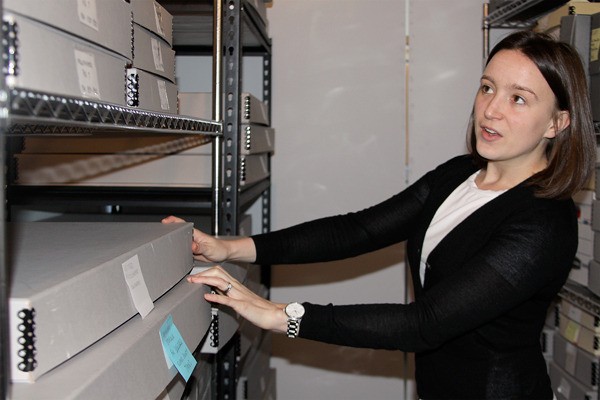A day rarely goes by that Rick Castellano doesn’t feel a sense of approval from Janet Enzmann.
After all, whenever he’s headed to his second-story office at the Island County Historical Society Museum, he is met by a painting of Enzmann at the top of the stairs.
“We are greeted by her smile every day,” Castellano said.
Castellano, the museum’s executive director, believes Enzmann, who died in 2010, would be most pleased with progress being made with the archives and library bearing her name.
The Janet Enzmann Library and Archives is a tribute to her dedicated service as a museum volunteer. The archives have boldly entered a new era of preservation and documentation.
They’ve entered the digital age.
Sarah Aldrich was hired a year ago as the museum’s first paid full-time archivist to tackle the chore of modernizing the museum’s archiving system. Significant gains were made in recent months as she and a team of volunteers have been photographing delicate paper documents and converting them into a searchable digital format to be available for public inquiry and research projects.
The task to convert centuries worth of history on Whidbey and Camano islands is as tall as the boxes are stacked high in the museum’s archival storage room.
But Aldrich, 29, is up for the challenge.
“My goal is to recreate all of these boxes on a digital file,” she said. “That’s a long, longterm goal.”
“But what better way to make it accessible and usable?”
Last week, during an open house to showcase the museum’s archival storage, library and research room, Aldrich demonstrated the museum’s latest techniques to store and share information.
Using a crane-like device attached to the ceiling and connected to a digital camera, Aldrich and volunteer Jeni Morris demonstrated how they replicate history.
Morris positions the camera over an old newspaper. Aldrich, sitting at a nearby computer, presses a button to take the picture and place the image on her screen. She can zoom in to check the focus and edit the image.
Recreating various local and regional newspapers in such a way is the museum’s most pressing current archiving project.
Starting early this year, the photocopying team worked at near lightspeed digitizing newspapers, going from editions in the 1880s to already entering the 1950s.
“We’ve had days where we’ve taken nearly 1,000 photographs,” Aldrich said.
And laughed a little in the process.
“In the 1890s, every newspaper we photographed was kind of a treat because there was a recurring ad for a pill that cured everything,” Aldrich said. “One week, it was insomnia. The next week, it would be bowel bloat.
The third week, it would be pimples. It just went on.”
What excites Aldrich and Castellano most about the archiving work is the research capabilities afforded by going digital.
The museum is using optical character recognition software so keywords will be searchable.
The modern process saves time and the wear and tear on artifacts from handling.
After newspapers, Aldrich and her team will digitize historic photos and old documents. They’ve already started archiving some, taking items once collected, sorted and organized for years by past volunteer archivists such as Enzmann and Joan Peters.
“We have documents and family histories from all over the island and Camano Island,” Aldrich said. “We are not as strong in South Whidbey and Camano as we are in Coupeville and Oak Harbor. But one of my goals is to augment the collection and develop that.”
The public may visit the museum’s research room by appointment. Costs to reproduce photos and text are $1.50 and $1.25 and are negotiable for larger volumes of work.
Aldrich also is available to handle offsite research.
To reach her, call 360-678-3310 or email arc-ichs@whidbey.net



